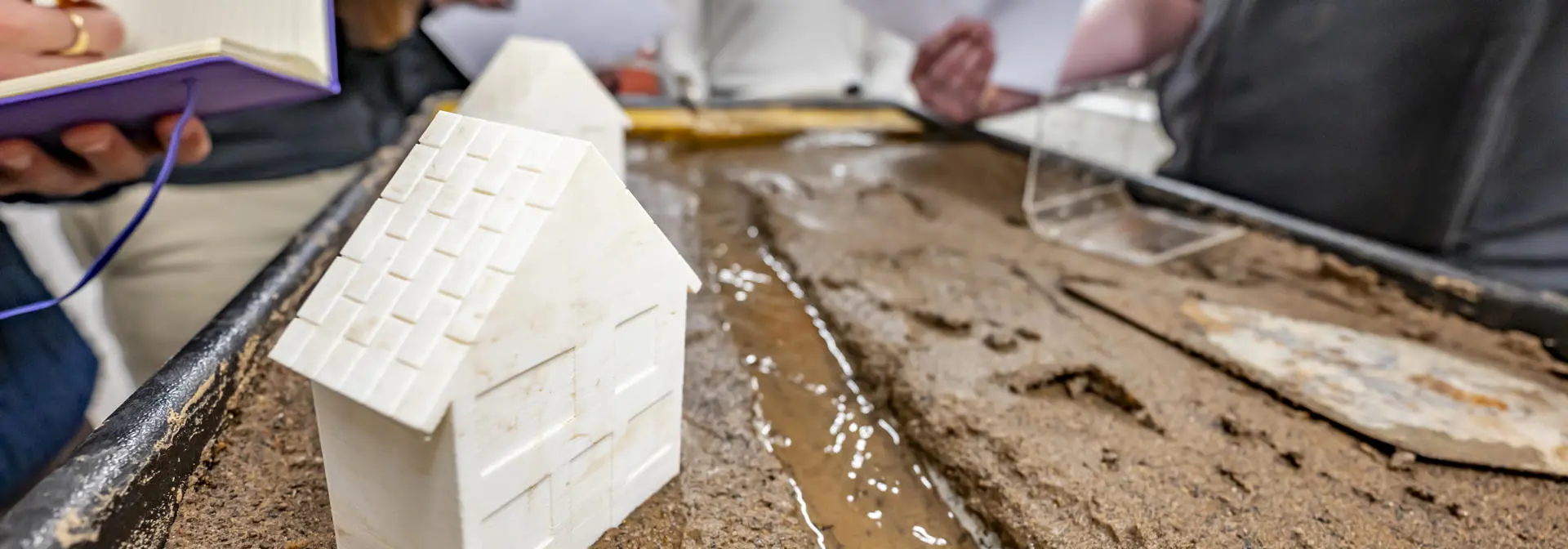Key information
Find out more about our 3 year honours degree option.
- UCAS code
- 3K3W
- Level
- Undergraduate
- Delivery type
- Full Time
- Degree qualification
- MA
- Mode of delivery
- On-Campus
- Duration
- 3-4 years
- Location
- Edinburgh
- Start date
- September
MA (Hons) Geography, Society and Environment will interest you if you want to specialise in human geography and related topics such as urban design, social policy and equity, sustainable cities, and sustainable development. Overall, this degree explores the ways in which people shape and are shaped by the places and environments in which they live.
You’ll consider questions such as:
-
How do cities change and how do the people involved shape those cities and neighbourhoods?
-
How does the built environment shape our behaviour?
-
What makes some places healthier or happier or more resilient?
Our industry links and cross-disciplinary learning style ensures our teaching is relevant in the real world, and you’ll experience what it is like to be a professional geographer working in practice. Throughout your studies, you’ll hear from guest practitioners from industry to gain insight into current approaches to solving challenges.
You’ll be taught through courses relevant to 21st century global challenges on topics such as aging populations, social inequalities, nature-based solutions and sustainable development, and you’ll gain employability skills such as digital mapping through geographical information systems and collaborative group working.
In years one and two, you’ll cover a broad range of fundamental courses on human geography (social, economic, and urban), physical geography (earth systems, hydrology, and geomorphology), transferable and geography-specific skills and practical fieldwork. You’ll specialise in human geography in the later years of the degree, studying cities, place and place making, and urban development.
You will develop field skills in surveying, mapping, and questionnaires, alongside important analytical and research skills. Through this cross-disciplinary, industry focussed, and problem-based degree, you’ll acquire the skills needed to work in multi-disciplinary teams and solve real-world problems. You’ll become flexible and creative with the ability to apply your skills and knowledge to a range of careers.
Your student experience
Your learning will be informed by the expertise of our research-active geographers and academics from The Urban Institute which sits within the School of Energy, Geoscience, Infrastructure and Society (EGIS).
EGIS is one of the United Kingdom’s leading institutions for multidisciplinary research and teaching in areas critical to economic development and societal equity. Our teams work closely and have links with industry, and practitioners are regularly invited as guest lecturers in most courses and advise on student research projects.
Go Global
There are currently no Go Global opportunities for this particular programme. However, other Go Global opportunities may be available. Please contact studywithus@hw.ac.uk for more information.
Course content
September Intake - Edinburgh
Year 1
Mandatory September
- Geography Today
- Dynamic Earth 1
- Introduction to Human Geography
- Shaping Tomorrow Together A
Mandatory January
- Dynamic Earth 2
- Scottish Geographies: Fieldwork Observation
- Human Geography & The City
- Shaping Tomorrow Together B
Year 2
Mandatory September
- Catchment Hydrology
- Surveying and GIS
- City Life and Difference
Optional September
- Introductory Biology 1
- Introduction to Scottish Studies
- Management in a Global Context
- Mathematics for Scientists 1
- The Economy
Mandatory January
- Global Challenges 1
- Geomorphology, Landscapes and Society
- Geography Toolbox
Optional January
- Introduction to World History and Culture
- Critical Writing
- Employability and Professional Skills
- Film and Cultures
- Contemporary Economic Policy and Institutions
Year 3
Mandatory September
- Global Challenges 2
- Theories and Methods in Geography 1
- Place and Place-Making
Optional September
- Marine and Coastal Geography
- River Geomorphology: Form and Process
- Transportation Systems Planning
Mandatory January
- Theories and Methods in Geography 2
- Comparative Urban Development
- Nature-Based Solutions in the City
Optional Janaury
- Energy and Buildings
- Environment and Behaviour
- Environmental Technology and Management
Year 4
Mandatory September
- Research Dissertation (Urban Studies)
- Urbanisation in the Global South
Optional September
- Marine and Coastal Geography
- River Geomorphology: Form and Process
- Comparative Social and Cultural Issues
- Transportation Systems Planning
Mandatory January
- Research Dissertation (Urban Studies)
- Social Sustainability
Optional January
- Design Project (Urban Studies)
- Sustainable Development and the Intercultural Context
Disclaimer
The courses mentioned above may change between now and the time that you study. For more information, please view our Terms and Conditions.
Programme Video
Geography at Heriot-Watt
Student testimonials
Vinny Pemberton
See moreI studied Physical Geography as I have always enjoyed a more natural setting and learning about the many natural processes across our globe. I chose this degree to lean more into biodiversity specifically and how this can be protected alongside our ever-growing societies. I originally chose to study at Heriot-Watt for its surroundings, as the campus is so beautiful. But after four years, the Sports Union and other student communities became a huge part of my life. Volunteering and helping others engage with the many facilities was something I became very passionate about.
Fees and funding
| Status | Fee |
|---|---|
| Scotland | Paid by SAAS |
| England / Wales / N Ireland / Rep of Ireland | £9,790 |
| International | £21,192 |
- Status: Your residency status is usually defined as the country where you have been ordinarily resident for the three years before the start of your course.
- International: 'International' includes applicants from European Union countries who do not hold Pre-Settled or Settled status in UK. (This does not include students from the Republic of Ireland - see above).
Scholarships and bursaries
Bursaries for students from England, Northern Ireland or Wales
In addition to government loans and grants towards the costs of fees and living costs, we are offering generous financial support to attract and support eligible undergraduate students from England, Northern Ireland or Wales:
- Heriot-Watt University Bursary (up to £3,100 per year)
Entry requirements
We have standard entry requirements for all of our courses that you will have to meet.
Year 1
Standard entry requirements
- Highers AABB (over two sittings).
- A-Levels BBC.
- International Baccalaureate 29 points.
- BTEC Extended Diploma DMM.
- HNC B in graded unit.
Please check that you meet our University-wide National 5/GCSE (or equivalent) English and Maths requirements.
Minimum entry requirements *
- Highers BBBC (over two sittings).
- A-Levels BCC.
- International Baccalaureate 29 points.
- BTEC Extended Diploma DMM.
- HNC B in graded unit.
* Minimum: under our Fair Access Policy, we will relax our standard entry requirements for some Scottish and Rest of UK status students depending on their circumstances. Our minimum requirements will apply if you:
- live in an area within the Scottish Index of Multiple Deprivation lowest 20% (SIMD20) or POLAR4 Quintile 1 regions (RUK)
- or are care experienced.
We can also make exceptions for some Scottish students with grades above minimum but below standard. Read more about our Minimum and standard entry requirements.
Year 2
- Advanced Highers BB, plus Higher AABB.
- A-Levels BBB.
- International Baccalaureate 34 points.
- BTEC Extended Diploma DDM.
- HNC A in graded unit with 120 SCQF credit points.
- HND BB in graded units.
- Global College: Successful completion of our Engineering with Accelerator Programme
Year 3
- HND AB / BA in graded units. HND must be in a relevant subject.
Additional information
- For all years, applications are welcomed from holders of non-school qualifications, mature candidates and overseas students.
- If you do not see your qualifications here please contact us at studywithus@hw.ac.uk
- For applicants studying HNC, HND or BTEC qualifications, when submitting your application please ensure you list in full all the units you are currently studying, as specific units (e.g. in Maths) may be required.
English language requirements
If your first language is not English, we'll need to see evidence of your English language ability.
The minimum English language requirement for entry to this programme is IELTS 6.0 (or equivalent) with no score lower than 5.5.
If you do not have IELTS 6.0, we offer a range of English language courses to help you meet the English language requirement for this programme prior to commencing your studies.
Please see our detailed English language requirements.
Why Heriot-Watt
We're the top university in Scotland for graduate outcomes which means that more of our graduates are employed or in postgraduate education than any other institution in the country and we ranked 5th in the UK.
We're also rated number one in the UK for CEO or MD roles, meaning more of our graduates go on to become CEOs or MDs than any other university in the whole of the UK. On top of that, we have beautiful campuses, across the globe, so you'll get a truly international education. Our Edinburgh Campus is home to Oriam, Scotland's National Sports Performance Centre combined with plenty of wellbeing resources, prioritising fitness and mental health for all students. Our Global Research Institutes look at solving real world issues such as climate change and saving our oceans as well as working on the next medical technological breakthrough and the future of AI and robots.
Employability
Work and study
Salary
Potential career paths
- Conservation and environment professionals
Student life
Explore facilities, and chat to staff and students
Discover Uni course data
Discover Uni provides data on each university's degree courses across a range of measures including student satisfaction, graduate jobs and salaries.







